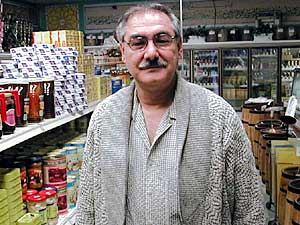|
Photos
More from MPR
Resources
Your Voice
|
Minnesotan from Iraq laments family's plight
January 20, 2004
A Minnesotan recently returned from Iraq says people there are happy the old regime is gone, but are fearful of the criminals preying on them. Sami Rasouli is an Iraqi-American and a Minneapolis businessman. He was born and raised in Najaf, a southern Iraq city where people suffered severe repression under Saddam Hussein. Rasouli visited several of his sisters still living in the country.
Minneapolis, Minn. — Sami Rasouli owns Sindbad's Cafe and Market on Nicollet Ave. in Minneapolis. The bespectacled Rasouli, 51, has a perfectly trimmed mustache. He sits at a round table in his restaurant and bakery, surrounded by cans and boxes of specialty foods from the Middle East on one set of shelves -- and bags of fresh unleavened bread from his bakery on another. Rasouli can't resist a plug.
"By the way, we are the only the bakery in this part world probably still making pita by hand," he says.
Rasouli is a math teacher by training, a businessman by accident, he says. He left Iraq in l976, before Saddam Hussein came to power, to teach in the neighboring United Arab Emirates. Later he moved to Germany.
He arrived in the United States 17 years ago, he says, seeking medical treatment for one of his three sons, and stayed. His sons are in college or high school, two of them in Minnesota. He was told he could be a teacher here only if he went back to college.
 | |||
"I couldn't afford that, had a family to feed," Rasouli says. "So I just jumped in a taxi at that time and became a taxi driver."
There are fewer than 500 Iraqis in Minnesota according to the 2000 Census. Rasouli's welcoming personality makes him popular with people who want to know what he thinks about events in his homeland. He opposed the U.S. invasion. However he says his family members in Iraq welcome the overthrow of Saddam.
During his three-week visit in November, he found his four sisters and their families are mostly well. They are better off than many Iraqis, he says, but they fear for their safety. He says crime, including revenge killings of former Baath Party members, is rampant.
"Kidnapping kids from schools or on their way to school for ransoms, especially kids that belong to wealthy families," Rasouli says. "Also, my brother-in-law who works in a funeral company, at the end of the day when he comes he reports to us that they got three or four more killed -- Baathists or people who associated with the Baath regime. And some of them got decapitated for just being different in their political belief."
Not all the schools are open, Rasouli says, because when Saddam was in power the teachers had to be Baath Party members. He says they fear for their safety if they return to the classroom.
Rasouli has been away from his homeland for 26 years. He says the Rasouli clan both suffered and prospered under Saddam's reign of terror.
"I found out like 15 members of the Rasouli clan were either killed or missing. And at the same time, some soldiers from the same clan during the Iran-Iraq war were awarded some medals and prizes," he says.
Rasouli says fresh water is in short supply at his sisters' homes, and the power system is not working. He says local entrepreneurs with gasoline-powered generators sell electricity to families to power lights and refrigerators.
Regime change in Iraq has made driving more dangerous. On his way out of the country, on a wide highway with a divider in the center, Rasouli was stunned to see drivers coming at him in his lane. He says robbers frequently stop drivers on the other side of the highway as they enter the country, because the cars are loaded with supplies.
"They are having money and having good cars," Rasouli says, "So they escape that lane to come to the other lane, where the Iraqis are leaving or the foreigners, causing also accidents -- especially at night time."
Before the war, Rasouli says, U.S. sanctions against trade with Iraq made life a living hell for his sisters and their children. Disease and malnutrition were rampant. Conditions are better now, but not for everyone.
During his November visit, Rasouli asked his family about a teenage boy begging in the neighborhood. He was told the child had been abandoned by his mother during the sanctions era and placed in an orphanage. The state-run orphanage closed when Saddam's regime fell. Rasouli says the boy begs for food from neighbors and has not found a place to live.
"It was a sad moment to see that teen laying against the wall with lots of dirt and dust and flies around him -- that was heartbreaking," Rasouli says.
|
News Headlines
|
Related Subjects
|

